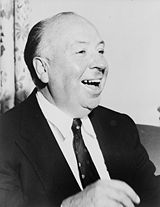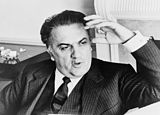Film director
The film director or film director (director, in feminine) or filmmaker is the person who directs the filming of a movie, gives instructions to the acting team, decides the camera setting, supervises the set and costumes, and all the other functions necessary to carry out the shooting.
Previously, he will have participated in numerous tasks, mainly the production of the technical script (framing, plane, camera movements, objective and angle), such as the selection or casting of those who will act and the other professionals, the natural settings in which the film, the sets or the final writing of the script will be shot.
Terminology
In cinema, the term filmmaker is considered synonymous with director. On television, on the other hand, the director is generally the one who directs the technical phase of recording both in the studio and on location, while the director may be responsible for the contents of a program. There is also a floor director and one of lighting, photography, etc. In the cinema, the director interprets the script, directs the actors, determines camera shots and angles, light, camera movements and duration of the take, among other things, which makes the filmmaker the counterpart of a film director. Today film directors are recognized as the authors of the audiovisual product in which they work.
In Latin America (as in the United States) this meaning of the term director does not exist, but only director or general director. In Spain both titles are applied indistinctly to film directors, while filmmaker is applied to professionals who have functions equivalent to that of film director.
In Mexico, the role of the film director is a trade that does not have much support or much technology for its full realization, it has suffered for many years of political conditions that compromise the artistic vision. However, in recent years there has been a resurgence by various directors, such as Alejandro González Iñárritu, Luis Estrada, Guillermo del Toro and the brothers Carlos and Alfonso Cuarón.
The training of the television director is broader. It includes film directing and requires greater knowledge and practice for the execution of live programs, both in the studio and outdoors with multiple cameras. This work implies the simultaneous control of highly sophisticated electronic equipment and the coordination of other professionals who collaborate in the studio, technical control, mobile units and television stations (cameramen, graphic designers, lighting designers, set designers, sound technicians, mixers, VTR technicians, liaison technicians, engineers and others).[citation needed]
The expression comes from the term realisáteur, used in France both in film and television for directors.[citation needed]
Responsibility
Film directors create an overall vision through which a film is ultimately made. Making this vision a reality includes overseeing the artistic and technical elements of film production, as well as directing the shooting schedule and meeting deadlines or deadlines. This involves organizing the film crew in such a way as to achieve their vision for the film. This requires group leadership skills, as well as the ability to maintain a singular focus even in the most stressful environment and fast-paced motion of a movie set. Additionally, an artistic eye is required to frame shots and give precise directions to cast and crew, therefore excellent communication skills are a must.
Since the film director depends on the successful cooperation of many creative individuals with differing ideals and possibly conflicting artistic visions, he also needs to have conflict resolution skills to mediate whenever necessary. The director ensures that all people Those involved in film production work to achieve an identical vision for the entire film. The set of different challenges he has to face have been described as "a multidimensional puzzle with different egos to complete". Adding to the pressure that the The success of a film can influence when and how they will work again. Budget limits on films are also ubiquitous. In addition, the director may have to ensure that the film receives a certain age rating. Theoretically, the only A director's superior is the studio that finances the film; however, a bad professional relationship The onal between a film director and an actor could result in the replacement of the director if the actor or actress is a film star. Even so, it is not in dispute that the director spends the most time on a project., considering that it is one of the few positions that requires intimate involvement during every stage of film production. Therefore, the position of film director is widely considered to be highly stressful and demanding. It has been said that "20-hour workdays are not unusual".
Under European Union law, the film director is considered the "author" or one of the authors of a film, largely as a result of the influence of auteur theory. The auteur theory is a concept of film criticism, as it holds that a film director's film reflects the director's personal creative vision, as if he were the main author (in French, auteur) Despite the fact that the production of the film is part of an industrial process, and at times because of it, the author's creative voice is clear enough to shine through the interference of the studio and the collective process.
Contenido relacionado
Pulp fiction
Gentlemen Prefer Blondes (1953 film)
Robin Hood: Prince of Thieves



